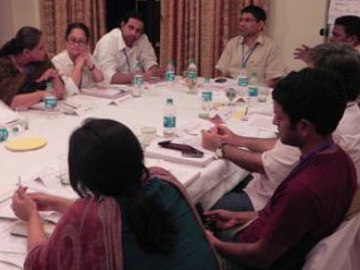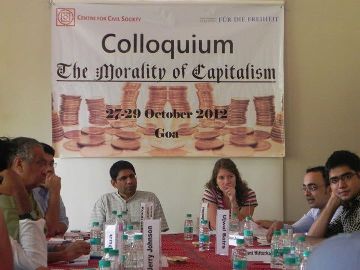Colloquium on Education: Philosophy, Policy, and Practice
22-24 August 2014, Jaipur


Some pictures of sessions from past colloquiums
It is rarely questioned whether education is a legitimate role of the state. Yet there are good reasons to be critical of government involvement in education. In recent decades, it has become clear that state central planning lacks the knowledge and flexibility required to achieve its objectives. Decentralised, evolutionary systems that enable diversity, trial and error, feedback, and competition have been shown to lead to more dynamic improvement both in theory and in practice. So why are people so uncritical about the idea of a one-size-fits-all, top down, bureaucratic system of schooling?
Furthermore, liberals have long fought for the rights of conscience. Freedoms of thought, of speech, of press, of assembly, and of religion are all fundamental to the rights of man and they have argued for a strict separation of state from each of these arenas of life. Can this freedom of conscience be reconciled with the idea of a compulsory, standardised, and state-controlled system of education? Can a free society long be maintained when those in control can decide what children will be taught to think?
- What are the rights of children? Who has a right and obligation to choose for the child? Parents, the state, or the child himself?
- What is role of education in society? And what kind of educational system is appropriate for a free society?
- Should governments have a role in socializing and indoctrinating their citizens? Does compulsory education violate the rights of children or of their parents?
- What institutions are most likely to lead to dynamic improvement and learning in the classroom and in society?
Centre for Civil Society in partnership with Friedrich Naumann Foundation is organizing a colloquium on ‘Education: Philosophy, Policy and Practice’. Through this colloquium we will explore these questions together and apply the thoughts of liberal social theorists to the problems of the classroom and of liberal educators to the problems of society.
In order to participate, one must be able to attend the entire Colloquium (Check in: after 12 pm on 22 August, Check out: before 12 pm on 24 August). The formal program will begin with an opening dinner reception on 22 August and will end with a closing dinner on 24 August. 'Participants may choose to leave after dinner on 24 August or the following morning after breakfast.
Eligibility: Professionals with domain knowledge, experience or interest on the chosen theme of the Colloquium from corporate, think tanks, development sector, government, academia or the media are eligible.
Registration Fee: The fee for the colloquium is Rs 4000, which includes all meals mentioned in the program schedule and a three-night stay at the venue. This fee is payable upon selection, and payment can be made online or through cheque/DD.
Application Closed. List of confirmed participants!

